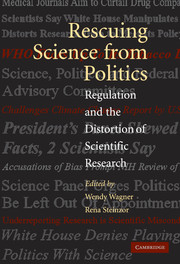Book contents
- Frontmatter
- Contents
- About the Contributors
- Acknowledgments
- Prologue
- Introduction: Principled Science
- PART I FREEDOM AND INDEPENDENCE
- 1 Defending Clean Science from Dirty Attacks by Special Interests
- 2 Basic Science at Risk: Protecting the Independence of Research
- 3 Publication Bias, Data Ownership, and the Funding Effect in Science: Threats to the Integrity of Biomedical Research
- 4 Science and Subpoenas: When Do the Courts Become Instruments of Manipulation?
- PART II TRANSPARENCY AND HONESTY
- PART III A PUBLIC INFRASTRUCTURE FOR SCIENCE
- PART IV RECOMMENDATIONS AND CONCLUSION
- Index
3 - Publication Bias, Data Ownership, and the Funding Effect in Science: Threats to the Integrity of Biomedical Research
Published online by Cambridge University Press: 04 August 2010
- Frontmatter
- Contents
- About the Contributors
- Acknowledgments
- Prologue
- Introduction: Principled Science
- PART I FREEDOM AND INDEPENDENCE
- 1 Defending Clean Science from Dirty Attacks by Special Interests
- 2 Basic Science at Risk: Protecting the Independence of Research
- 3 Publication Bias, Data Ownership, and the Funding Effect in Science: Threats to the Integrity of Biomedical Research
- 4 Science and Subpoenas: When Do the Courts Become Instruments of Manipulation?
- PART II TRANSPARENCY AND HONESTY
- PART III A PUBLIC INFRASTRUCTURE FOR SCIENCE
- PART IV RECOMMENDATIONS AND CONCLUSION
- Index
Summary
The Social Context of Science
The noun science and all of its adjectival forms confers a sense of authority to its associated activities. Nearly everyone wants to be on the side of “good science.” Environmental agencies speak of “science-based” policy, while the Food and Drug Administration (FDA) and many professional societies identify themselves with “evidence-based” medicine. Strong disagreements among scientists can create a cognitive dissonance within the popular culture. Yet, despite its authoritative position, the system of science – consisting of research and educational institutions, certified practitioners, journals and funding agencies – is embedded in a social context. The elements that make up this context can influence the questions that get asked, the studies that get funded, the results that get published, and the biases that enter into scientific practice and impair its quality.
The normative structure of science has evolved over centuries, beginning with the Enlightenment, continuing through the development of nation-states and the rise of international scientific societies, and during the current era of globalization. That structure includes a shared set of goals for uncovering the truths about the natural world, the recognition that science is a social activity that demands openness and transparency of claims and evidence, and the commitment to an epistemology that embodies a standard of empirical verifiability for certifying knowledge claims.
- Type
- Chapter
- Information
- Rescuing Science from PoliticsRegulation and the Distortion of Scientific Research, pp. 61 - 85Publisher: Cambridge University PressPrint publication year: 2006
- 7
- Cited by



